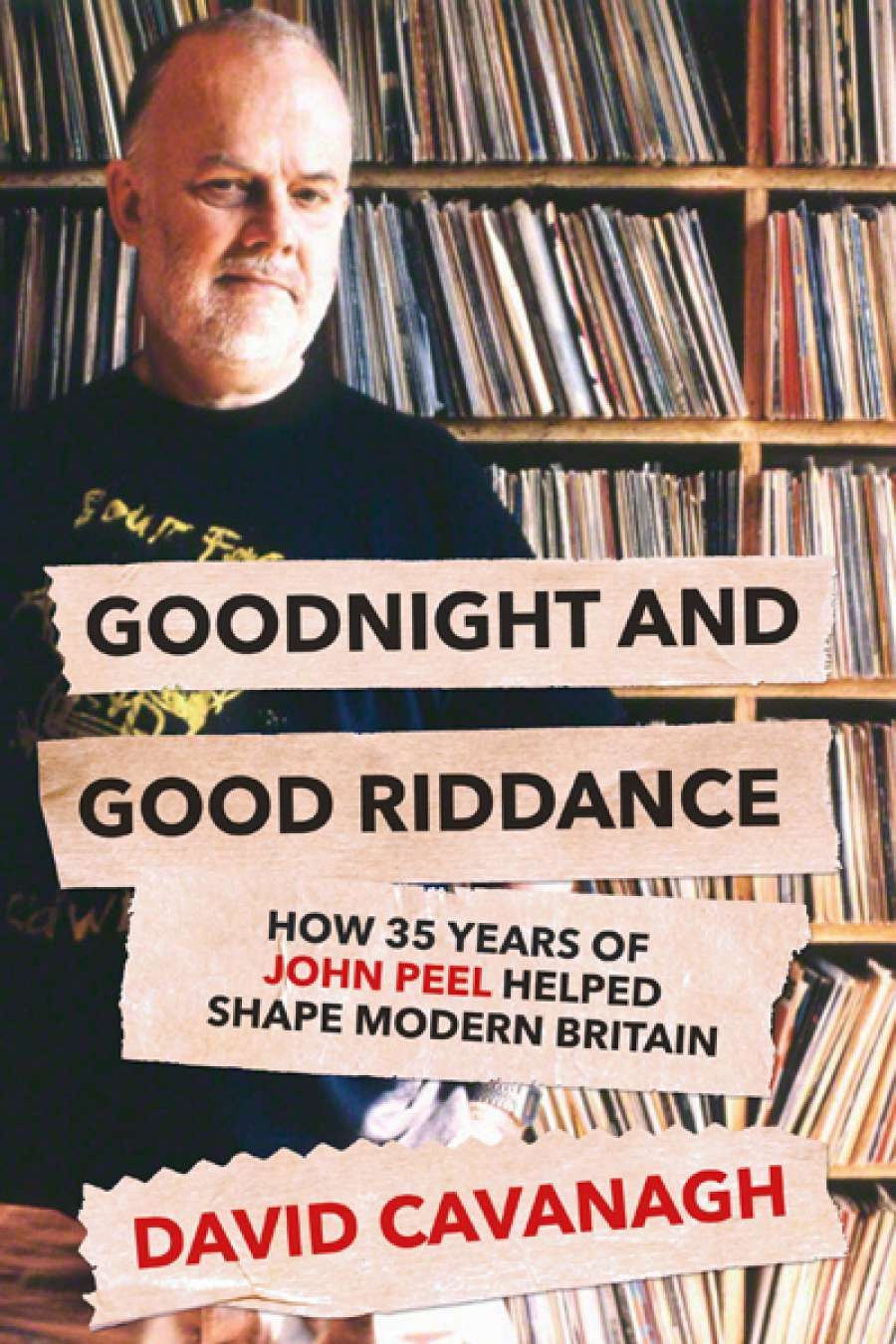
- Free Article: No
- Contents Category: Music
- Custom Article Title: Fiona Hile reviews 'Good Night and Good Riddance' by David Cavanagh
- Review Article: Yes
- Online Only: No
- Book 1 Title: Good Night and Good Riddance
- Book 1 Subtitle: How Thirty-Five Years of John Peel Helped to Shape Modern Life
- Book 1 Biblio: Faber, $45 pb, 620 pp, 9780571302475
Despite this, there are plenty of clever grammatical decisions, flashes of novelistic prose, and even a few scalp-tingling moments. Peel's voice is 'weirdly placid ... like it may have brainwashed itself into a trance'; eight minutes of German industrial music sounds like 'the council digging up a road'. The famous 'Peel Sessions', originally devised by Radio 1 to extricate itself from the Musicians' Union regulations that prohibited it from exceeding a certain amount of daily 'needle time', are occasionally narrated as if Cavanagh is there in the studio. Nick Cave 'lashes out angrily with his boot at anyone unwise enough to stand too near the stage'. In 1981, Peel wonders if the singer of the young Sheffield band he is about to play is any relation to Joe Cocker. No, he isn't: it is Jarvis, seventeen years old and fourteen years away from his first number one album.
References to political upheavals, anti-war marches, environmental disasters, drug busts, and various technological and social breakdowns and innovations (the British Railways' 1968 ban on steam trains, the recapture of the island of South Georgia in the Falklands) provide fascinating insights into the culture that shaped Peel, but they make it difficult to take Cavanagh's sub-titular claim seriously. Clearly, Peel was more cipher than instrument, a man of the times, adept at going with the flow. If Cavanagh can too often sound like a one-man PR company, there are moments of refreshing disappointment in his subject: Peel's tasteless remark following a song about schoolgirls 'makes the stomach sink'; Peel's marriage at the age of twenty to a fifteen-year-old American 'will prove controversial when the media examines the personal lives of DJs following the Jimmy Saville scandal in 2012'.
 John Peel, 1978
John Peel, 1978
Cavanagh has set out in detail here and elsewhere the degree to which he believes Peel enhanced and in many cases initiated the careers of a long list of bands and musicians that takes in Pink Floyd, Joy Division, The Specials, The Ramones, Nirvana, New Order, David Bowie, Mike Oldfield, Led Zeppelin, John Lydon, and many others. (Elvis Costello, curiously, managed to elude Peel's radar for more than half a decade until signing with Stiff in 1977 flushed him out into the open.) A 1972 session with Roxy Music is said to have precipitated a three-year touring momentum that enabled the formation of Siouxsie and the Banshees so they could go on to influence everyone from The Cure to My Bloody Valentine. 'We're all, in a sense,' Cavanagh asserts, 'living in Peel's world today.' Credit where credit is due, but an overblown claim such as this diminishes the role of bands in the construction and dissemination of their own music and the agency of audiences in forming the mythologies that spring up around musical cultures.
Cavanagh had his work cut out for him condensing into 620 pages the famously eclectic span of Peel's musical and cultural interests – 'his addiction to diversity, his empathy with outsiders, his non-linear running orders, his sudden disappearance down musical rabbit holes and his bizarre juxtapositions'. The result, though at times a little too organised, is immensely informative. The final paragraph finishes on a nostalgic note: the combined record sales of seventeen of the most prominent bands espoused by Peel 'now exceed 1.5 billion'. As Elvis Costello noted in his recent memoir, Unfaithful Music and Disappearing Ink (2015), 'the very same gadgetry that dismantled the music business' enables him to keep in touch with his family while he is on tour. Gone are the days when a musician might make a living from record sales alone. Time to pack up the family business and hit the road.


Comments powered by CComment